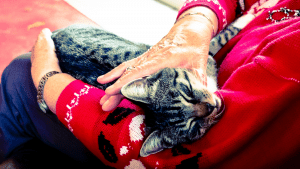An Older Adult’s Guide to Caring for Pets
 Whether it’s a cat or dog, pets make our lives better. This is especially true for older adults, but it can be tough to know how to choose and care for a new pet. If you’re a senior who wants to enrich your life with a new pet, you’ll want to keep these essential tips in mind.
Whether it’s a cat or dog, pets make our lives better. This is especially true for older adults, but it can be tough to know how to choose and care for a new pet. If you’re a senior who wants to enrich your life with a new pet, you’ll want to keep these essential tips in mind.
Choosing the Right Pet
As an older adult, you should keep your lifestyle in mind when looking for a new pet. Think about the space you have at home and what animal will fit in with your routine. Cats are generally low-maintenance and are a good option for people with limited activity. If you’ve always dreamed of having a dog, however, don’t let mobility issues stop you. You can always hire a dog walker to help your pet get the exercise it needs. No matter what type or breed of pet you decide on, think about adopting to save the life of a shelter pet.
Stocking Supplies
You’ll need some a few essential items to care for your new pet. You can get what you need from a local pet store or order them online if that’s more convenient. Pick up a pet bed, bowls, and toys for whatever pet you desire. Depending on the type or breed of animal you choose, you may need some specialty supplies to provide proper care for your pet. Long-hair animals need specific brushes, and pets with special needs will need unique equipment as well.
Preparing Your Home
If you haven’t had a pet in your home, you’ll need to make some changes to keep your new pet safe and cozy. Look over any household plants and use this guide to determine if they are toxic to animals. For dogs, placing items out of reach will do the trick, but cats can get into high places, so you may need to get rid of poisonous plants altogether. If you plan on letting your pet use your yard, make sure it’s secure to prevent escapes. Also, check for poisonous plants there as well. Repair any damage to fencing or consider installing a fence.
Helping New Pets Adjust
As an older adult, you know how hard change can be. Animals are even more sensitive to change than humans, so give your new dog or cat some time to settle into your shared life together. Make sure they have their own space where they can feel relaxed. Provide positive attention and use treats/toys to reward good behavior. If your new pet acts out, know that this could be temporary anxiety, but take steps to resolve any major behavioral issues. One idea is to use a dog-training collar so your pup can learn to obey commands. These collars don’t have to give your dog a shock; some collars use sounds and beeps instead of an electric shock.
Feeding Your Pet
It can be tempting to sneak that bacon to your pet every morning, but human food can be extremely hazardous to pets. To keep your pet healthy, stick to a food that has been specifically formulated for their health. If you adopt an animal with allergies or tummy issues, find a food that will help control their symptoms. It’s also handy to have some knowledge of supplements and additions that can help relieve common pet problems such as constipation and itchy skin. Feed treats sparingly, and make sure those snacks are healthy as well.
Maintaining Pet Health
To keep your new pet happy, you need to make health a top priority. Most animals receive basic care in the shelter, but you should schedule your own vet visit as soon as possible. During this initial appointment, your vet will examine your pet and create a plan to take care of any issues. Vaccinations may need to be administered, and your vet can microchip your pet if needed. If your pet is not spayed or neutered, take care of this as soon as possible, and keep them up to date on any monthly preventatives.
Pets bring endless benefits to the lives of seniors, and all they ask for in return is love and care. Make sure you know how to look after your new pet and nurture a bond between the two of you that will last a lifetime.
Guest post by: Natalie Jones








